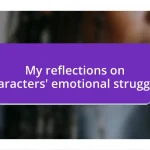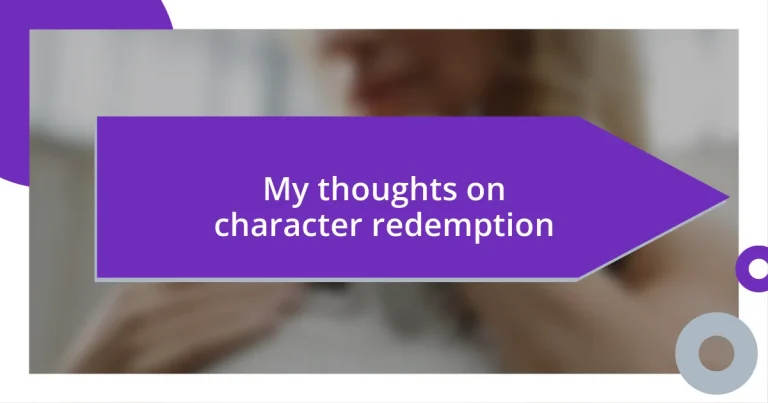Key takeaways:
- Character redemption involves a personal journey of growth and self-discovery, often marked by sacrifice, forgiveness, and transformation.
- Well-developed characters enhance engagement and relatability, creating emotional depth and driving the narrative forward.
- Successful redemption arcs are characterized by moments of realization, vulnerability, and the act of making amends, emphasizing the importance of relationships and personal change.
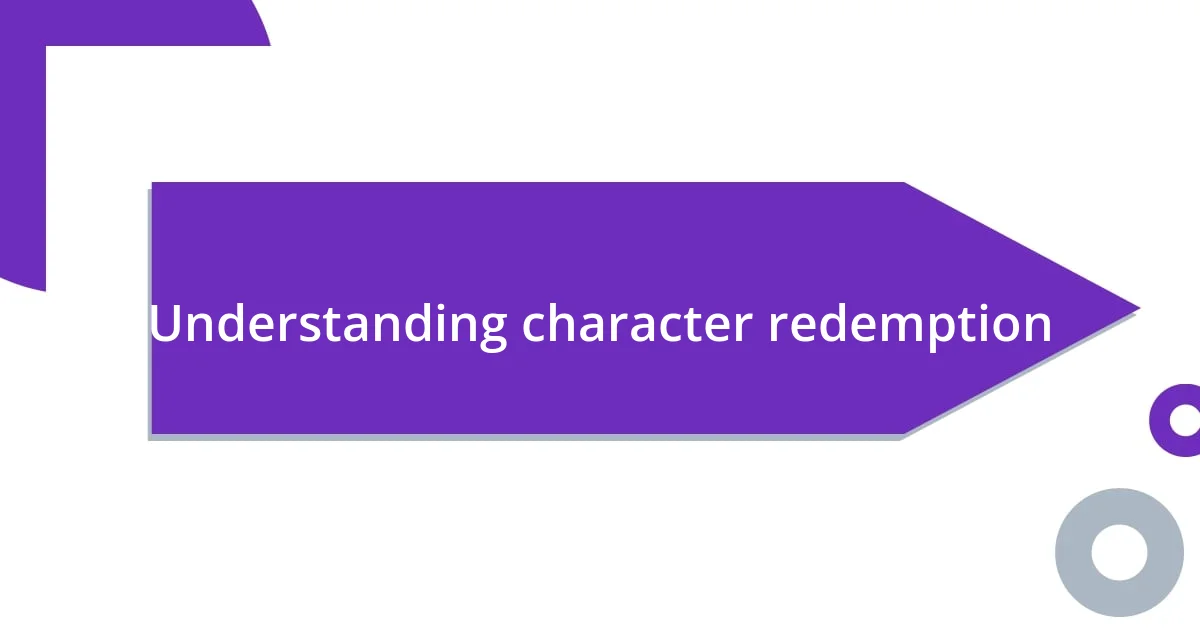
Understanding character redemption
Character redemption is a fascinating concept, often rooted in the desire for change and growth. I remember reading about a character who initially seemed irredeemable, a villain with no real moral compass. Yet, as the narrative unfolded, I found myself asking, what if I were in their shoes? Could I ever overcome my past mistakes or embrace a better version of myself? This kind of introspection makes character redemption feel deeply personal, doesn’t it?
It’s intriguing to see how characters navigate their paths toward redemption. Take, for instance, the moment a once-selfish character sacrifices something for the greater good. I often think of the emotional weight that action carries. It’s not just about making amends; it’s a significant shift that forces both the character and the audience to reconsider their definition of forgiveness. Have you ever felt that instant of recognition when a character makes a turning point? I certainly have, and it sparks a desire to reflect on our own choices.
Redemption isn’t just a plot device; it’s an exploration of the human soul. Sometimes, I feel like these stories hold a mirror to our own lives, showing us that healing is a journey filled with setbacks and triumphs. Just like real-life redemption, every character’s journey is unique and often messy. Isn’t it captivating how a flawed character can become someone we root for? That transformation can leave a lasting impact on us, reminding us that change is possible and that we all have the potential for growth.
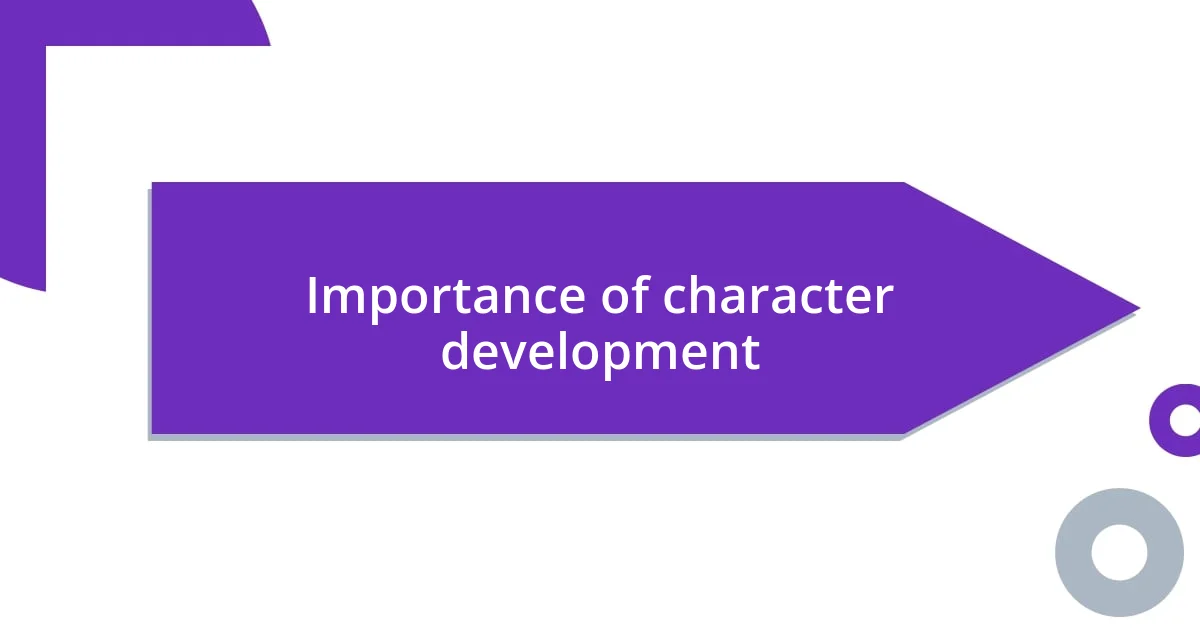
Importance of character development
Character development is crucial because it drives the narrative forward and draws readers into the emotional journey. I’ve often felt my heart race when a character I initially disliked slowly reveals layers of complexity. It’s like peeling back an onion, finding that under the tough exterior lies pain and longing for connection. This revelation can create a powerful bond between the character and the audience, allowing us to empathize with their struggles and aspirations.
- Engagement: Well-developed characters grab our attention and keep us invested in their journey.
- Relatability: Flawed characters reflect our own imperfections, making it easier for us to connect with them.
- Transformation: Witnessing a character evolve highlights the theme of growth, reminding us that change is possible.
- Conflict Resolution: Character development often drives the story to its climax, allowing for satisfying resolutions.
- Emotional Depth: The more we learn about a character’s backstory, the more emotionally impactful their actions can become.
On a personal note, I find that character arcs often resonate with my own experiences, whether in fiction or real life. Seeing a character wrestle with their choices encourages me to reflect on my own beliefs and decisions. It’s this interplay between character and reader that makes stories unforgettable.
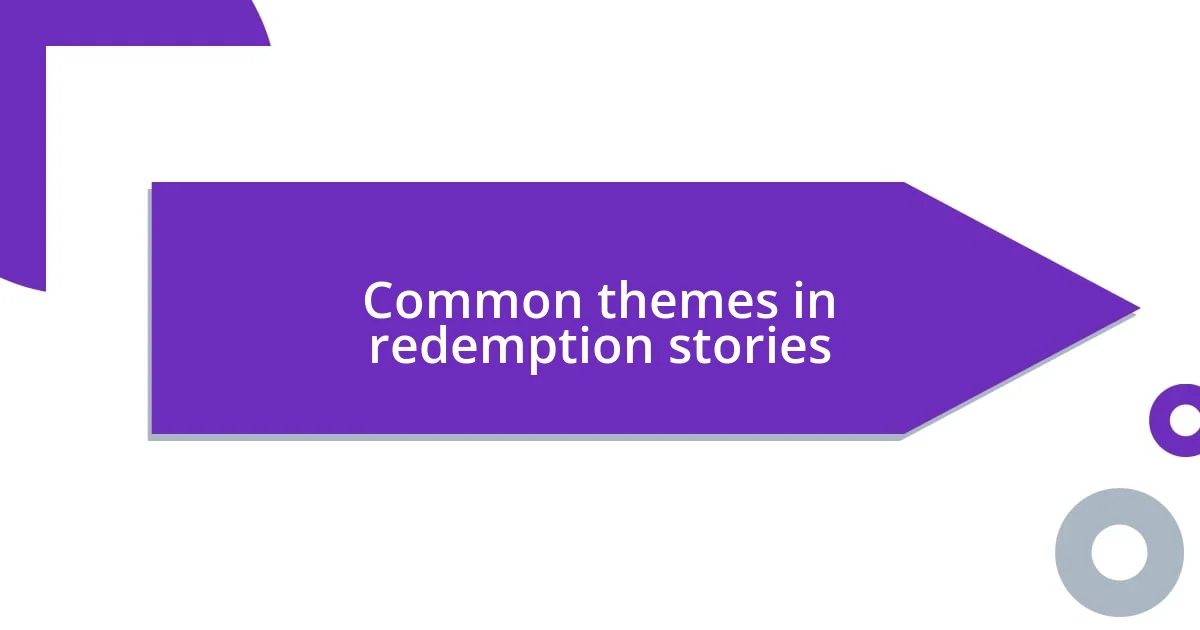
Common themes in redemption stories
Redemption stories often revolve around the theme of self-discovery. Characters embark on a journey not just to right their wrongs but to understand who they truly are. I remember reading about a character who, after many missteps, finally faced the consequences of their choices. This moment of reckoning forced them to confront their past. It was here that I realized how powerful self-awareness can be in the process of redemption; the journey of finding oneself unravels a tapestry of emotions and truths.
Another common theme is the concept of forgiveness, both from oneself and from others. I once encountered a story where the protagonist committed an unforgivable act, yet the path to redemption was paved with forgiveness. As I turned each page, I found myself asking, what does it mean to truly forgive? The emotional weight of this theme resonates deeply with me, as I’ve often found that forgiveness is a gift we give not only to others but to ourselves as well, releasing burdens we’ve carried far too long.
Additionally, the theme of second chances emerges prominently in many redemption arcs. Characters are often given another opportunity to make things right. For me, this theme evokes a sense of hope. It’s a reminder that no matter how grave our mistakes, we can always strive to do better. I often reflect on how a simple act of kindness or a sincere apology can lead to monumental changes, both for the character and the reader alike.
| Common Themes | Description |
|---|---|
| Self-Discovery | The journey of understanding one’s true self through challenges. |
| Forgiveness | Exploring the act of forgiving oneself and others as part of redemption. |
| Second Chances | The opportunity to rectify past mistakes and start anew. |
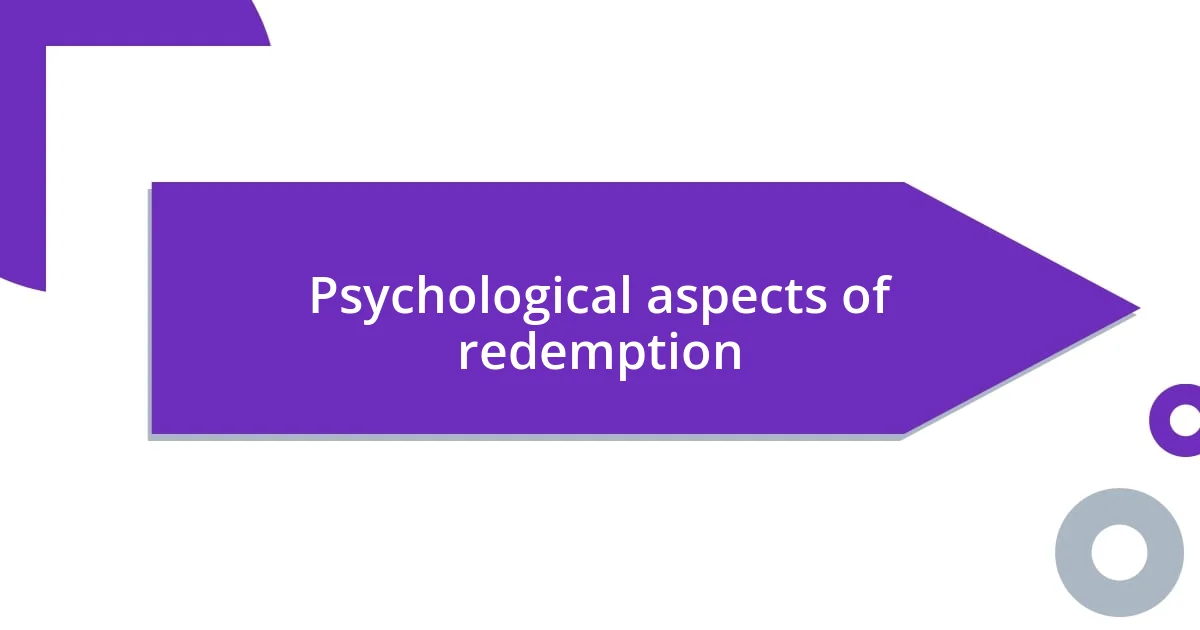
Psychological aspects of redemption
The psychological aspects of redemption are fascinating and deeply intertwined with our emotional landscapes. When I reflect on characters seeking redemption, I often see them grappling with guilt and shame, emotions that can either paralyze us or propel us forward. For instance, I’ve been in situations where I felt immense regret for a past mistake. That internal struggle made me appreciate how universal this journey is in both fiction and reality, often leading to profound personal growth when characters confront these feelings head-on.
One of the most compelling aspects of redemption is the role of self-forgiveness. I remember a story where a character, burdened by guilt, embarked on a quest not just to seek forgiveness from others but to forgive themselves. This resonated with me deeply because I believe that self-forgiveness is vital for moving on. It raises the question: can we truly change if we’re still shackled by our past? From my experience, letting go of self-imposed guilt often opens the door to transformation, allowing us to embrace new possibilities.
Moreover, the power of empathy plays a significant role in the psychology of redemption. I recall an encounter in a book where the protagonist’s journey was mirrored by the perspective of those they wronged. This duality of experience fostered a deeper understanding that only comes from walking in another’s shoes. It made me wonder how often we overlook the emotional complexities of others. By embracing empathy, we enrich not just our narratives but also our lives, bridging the gap between fallibility and forgiveness.
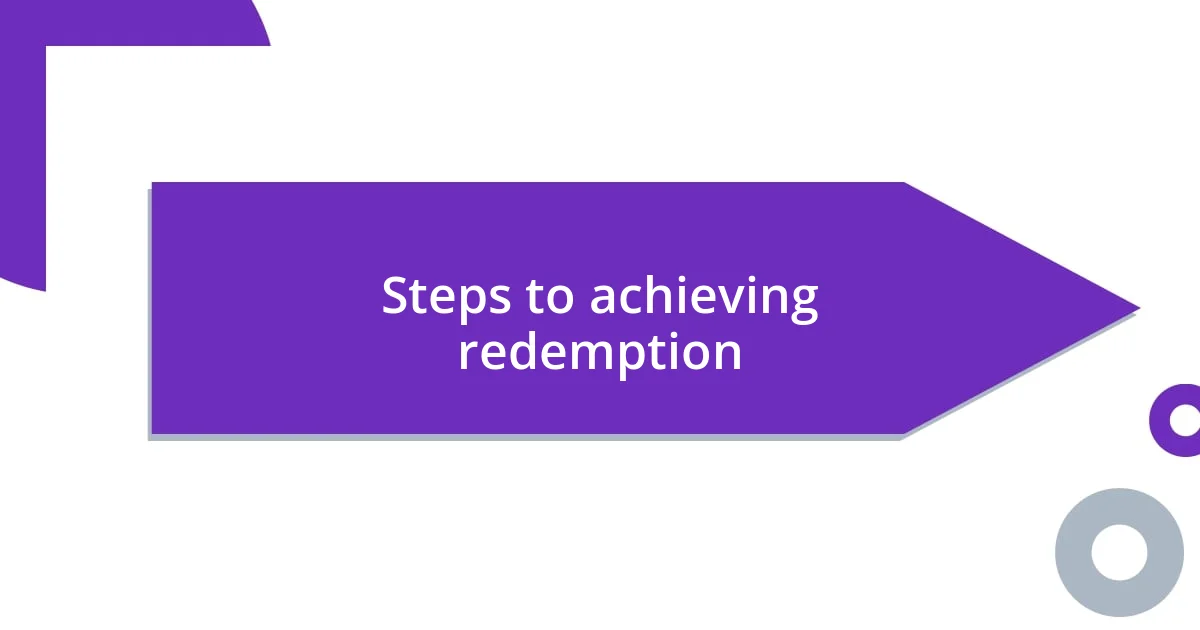
Steps to achieving redemption
Steps to achieving redemption can be both challenging and transformative. First, it’s crucial to recognize and acknowledge the wrongdoings that led us down this path. I remember a time when I had to admit to a significant mistake that affected someone I cared about. That moment of honesty was painful but necessary, creating a foundation for the redemption journey that followed.
Once we’ve confronted our past actions, the next step involves genuine remorse. I recall reflecting on how simply expressing regret is often insufficient; it’s about feeling it deeply. I once reached out to someone I had hurt, and instead of a scripted apology, I shared my true emotions. It felt like lifting a weight off my shoulders. This sincerity not only helped mend our relationship but also sparked my path toward self-improvement.
Finally, taking actionable steps to change is vital for redemption. It reminds me of a friend who, after struggling with addiction, committed to a support group. By watching her brave journey, I learned that change often requires consistent effort and accountability. Isn’t it interesting how some people can inspire us to pursue better versions of ourselves? By actively working to rectify past mistakes and committing to new habits, we embody the essence of redemption, turning past regrets into future growth.
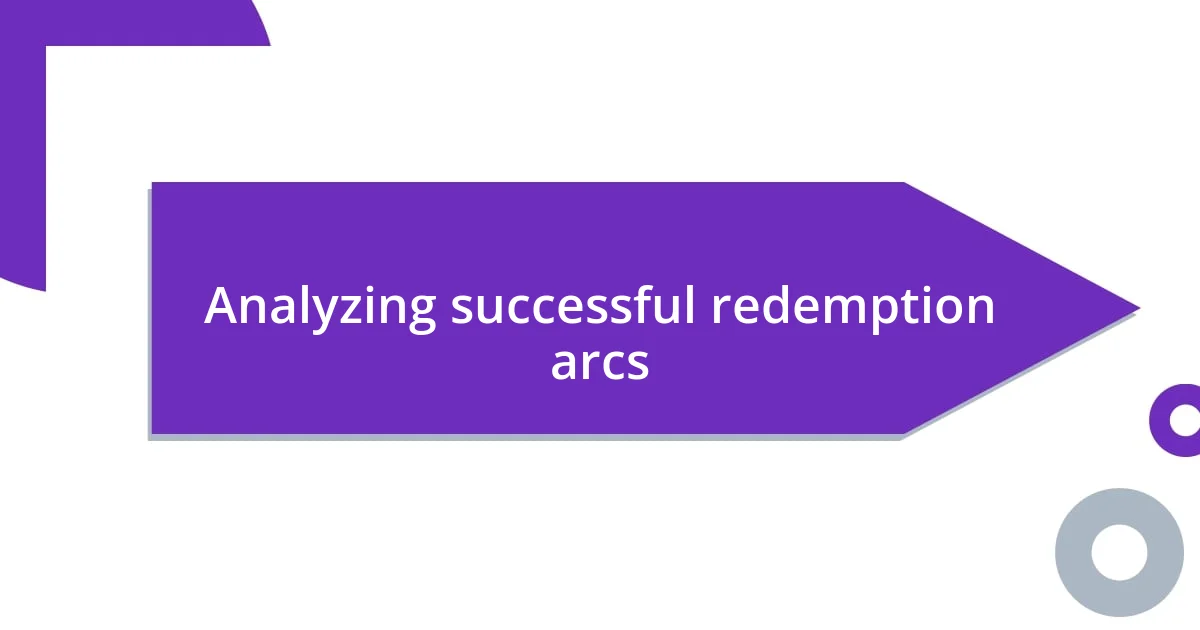
Analyzing successful redemption arcs
Exploring successful redemption arcs reveals a pattern that is both compelling and relatable. One character that comes to mind is Zuko from “Avatar: The Last Airbender.” His journey from villain to hero really struck a chord with me. What stands out is how his path was paved with struggles that made him question his identity. It’s captivating to see a character evolve by confronting their past, highlighting that redemption often requires us to face the parts of ourselves we’d rather hide.
In many narratives, redemption is also tied to external relationships. Take the story of Severus Snape from the “Harry Potter” series—here’s a character whose redemption hinges on his love and sacrifices. I remember being moved by how his choices, though questioned throughout the series, ultimately revealed a complex character with deep emotional layers. When authors weave redemption arcs through relationships, they underscore the significance of connection; it makes me wonder how our bonds can challenge us to be better people.
Moreover, successful redemption arcs are often steered by moments of realization that prompt significant change. For instance, I think of a novel where a character had a life-changing experience that made them reassess their life choices. Could a single event really catalyze change? From my perspective, it often starts small—a conversation or even a quiet moment of reflection can ignite the desire to be better. These pivotal moments are what make redemption feel attainable and authentic, leaving us attached to the character’s journey long after we’ve turned the last page.
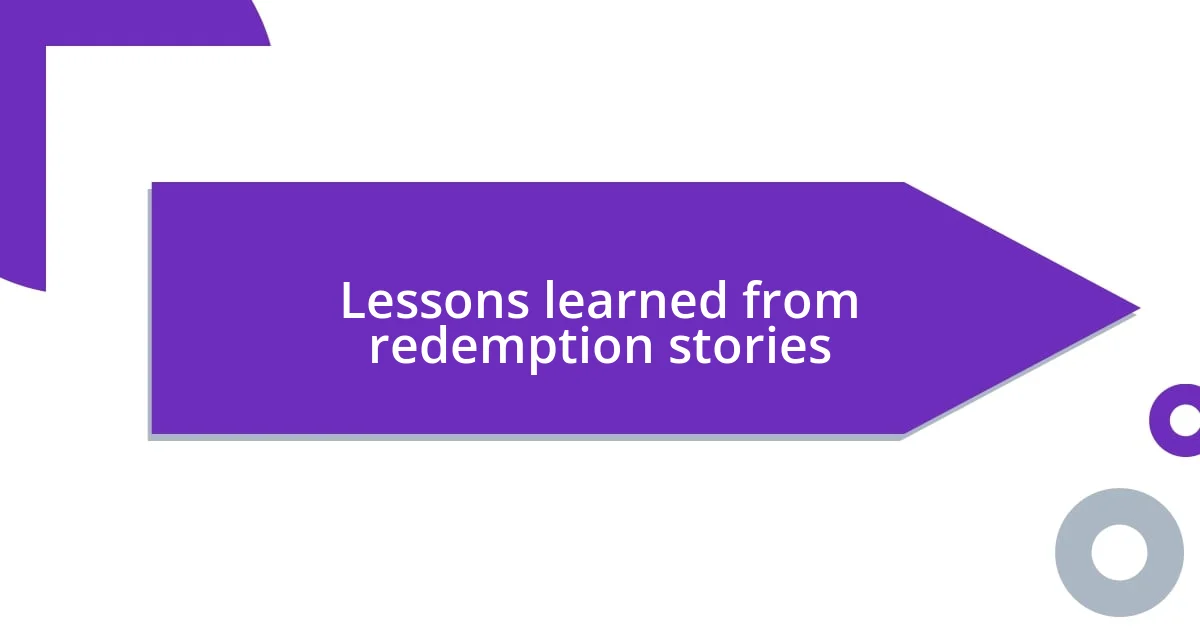
Lessons learned from redemption stories
Redemption stories often highlight the power of personal growth, showing that mistakes don’t have to define us. I recall a colleague who made a significant error in a project that not only impacted our team but also shook their confidence. Watching their journey from regret to a determined effort to learn and improve was inspiring. It reinforced for me that while we all stumble, it’s how we rise that truly matters.
Another lesson I’ve gathered from these stories is the importance of vulnerability. I remember confessing a failure to a friend, something I had been holding onto for far too long. In that moment of honesty, I discovered how sharing our struggles can forge deeper connections. It’s fascinating to think about how being open about our flaws can invite support and understanding, turning an isolating experience into a shared journey.
Moreover, redemption often involves a commitment to making amends. I think of a family member who, after years of estrangement, decided to reconnect with those they had hurt. They didn’t just apologize; they actively sought to rebuild trust over time, which took tremendous courage and persistence. This experience made me realize that taking deliberate steps, no matter how small, toward repairing a relationship can foster genuine healing. It makes me wonder—how many of us are hiding behind our mistakes instead of stepping into the light of change?










